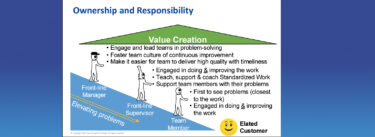Dear Gemba Coach,
My CEO, who supported lean, has left and been replaced by a pure finance guy. It doesn’t look good for the lean effort. What should I do?
Hmm. Tough call. Chances are that’s it, and it’s now a question of time before you admit it. I wouldn’t like to be negative about someone I know nothing about, but my experience in this matter is not so good.
On the one hand, one of my mentors is Orry Fiume, who was the CFO of Wiremold and living proof that finance guys can “get” lean deeply and promote it effectively. On the other hand, I’ve personally witnessed four cases where the finance guys took over. First, way back, when a financier was placed at the head of an auto supplier’s leanest division, and then a couple years ago when the company was sold to a finance-run group. Right after the Lehman Brothers debacle, finance seemed to have lost some of its luster, but in the past year, I saw two more cases where the CEO left and was replaced by either the finance officer or a finance representative of the shareholders. In every one of these cases, lean was abandoned and the business went back to the worst of financial management practices – so the odds for lean are not good.
Lean Management vs. Financial Management
Granted, my sample size is small, so the law of small numbers apply. I’m probably over-generalizing my personal experience. Still, there are reasons. As John Shook explains, at the base of LEI’s transformation model are “basic thinking, mindset, and assumptions.” In essence, this is what you discover on the gemba when you get to the bottom of a “5 why?” discussion. At the bottom of everyone’s spot opinion about any fact lies a calculation based on three beliefs:
- How things “really” are (regardless of how “surface” facts may appear)
- How things should be (regardless of what other people feel about it)
- The one way of getting from 1 to 2 (regardless of past experience).
These beliefs sum up our personal ideology. The whole point of scientific thinking is to express these three assumptions and test them against facts, but this mostly goes against our instinctive, “intuitive” nature. Science is what convinces us that, really, the earth goes around the sun although, quite obviously, we can see the opposite every day.
Lean’s ideology can thus be summed up as:
- Things are what they are at the gemba; you take them as they are with the people involved.
- They should be improved in the direction of zero accidents, zero defects, 1×1 in sequence, more variety, 100% value added, suggestions from all.
- The way of doing so is kaizen from every one, everywhere, all the time.
By contrast, financial management’s ideology is:
- Current margin is not good enough.
- Revenues should be increased and cost should be lowered.
- Find niches where you can hike prices up and reduce costs line-by-line on the budget.
Now, as lean guys we know that financial reasoning gets short-term gains at the expense of the company’s overall market position and future revenue – from GM’s bankruptcy to all the cases we’ve personally witnessed of financial thinking ruining perfectly good firms. But the finance calculation has two things going for it:
- It’s simple – hard to argue against making money from selling high and buying low.
- The data is pre-formatted this way: accounts, as they currently are, shine the light on sales and costs, and make wrong assumptions, such as having inventory as an asset, which fundamentally undermines any kind of lean thinking.
Get Used to It
Lean thinking-style cost accounting looks at the total cost of business, so it includes exceptional costs as not so exceptional, and focuses on showing the impact of inventory on cash, and then on profitability – increase your inventory turns, you will increase your margins. Indeed, Orry Fiume and others started the entire lean accounting movement to try and correct the fundamental flaws in traditional financial accounting. Unfortunately, these arguments only speak to leaners – who already share the lean ideology.
My sociology professor, the late Raymond Boudon, used to teach that most ideology had basis in rational thought, but was inappropriately applied to the wrong set of circumstances. In this instance, sell high/buy low ideology makes a lot of sense in new markets, but none at all in mature markets. (Why would people buy high what they can get elsewhere at lower prices, where we find low cost bargains when wages are catching up?.) That’s why lean is so powerful in mature markets – it’s another path to sustained profitability that relies on eliminating the waste from our ways of operating rather than seeking to take advantage of customers, employees, and suppliers.
Unfortunately, precisely because most ideological thinking makes intellectual sense (even if not pragmatic sense) it’s also very hard to shake. A pure finance guy, whose career has been built on finance ideas, would need extreme experience and an open mind to switch his thinking (as, indeed, was Orry’s case). Chances for lean’s survival at your company, therefore, are small indeed.
As Dr. Steve Peters puts it bluntly, the truth of life is that (1) life is not fair, (2) the goal posts move, (3) there are no guarantees. This, I am sorry to say, has just happened to you. You’re going to have to get used to the idea – the question is when?






